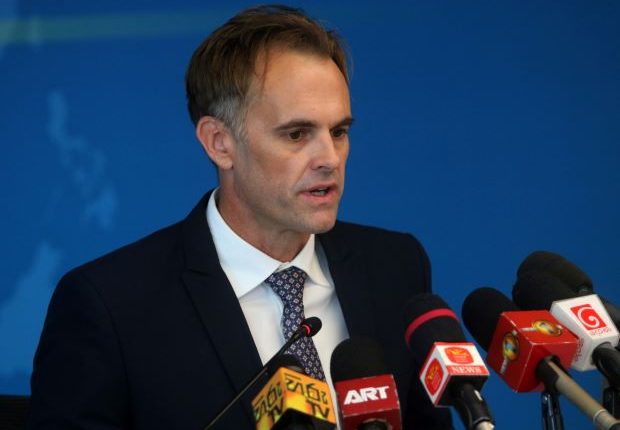World Bank concerned over potential reform fatigue in Sri Lanka’s election year
By Himal Kotelawala
COLOMBO — With elections coming up in Sri Lanka, the World Bank is concerned that reform fatigue could set in, leading to potential policy reversal, particularly with regard to state-owned enterprises (SOEs), a World Bank official said.
Senior Country Economist for the Maldives and Sri Lanka Richard Walker said that the World Bank is specifically concerned about SOE reforms as progress in that area has not been as rapid as hoped despite considerable macroeconomic gains made since the country’s worst financial crisis in decades.
“Maybe we haven’t seen it progress as far as we’d hoped. In terms of trying to put in place a much better framework to ensure better governance and options for private participation, that hasn’t moved as fast we’d hoped,” Walker said on the sidelines of an event held in Colombo on Tuesday (2) to launch the World Bank’s Development Updates for Sri Lanka and South Asia.
“We do hear different views on this out there. I think there’s a sense of ‘let’s keep these enterprises owned and managed by the public sector’, so we’re not clear where that’s going,” he said.
Asked if the World Bank has closely studied competing views expressed by Sri Lanka’s mainstream political parties on the matter of SOE reforms, Walker said the Bank is just starting to have conversations with various parties to understand what different stakeholders deem possible and see where common ground may lie.
“I think the sense is that you don’t want to maybe take too big a step initially, but there needs to be some sort of plan which would help orientate the country and economy in a better direction,” he said.
Walker also cautioned against the use of the word ‘privatization’.
“I think we should stay away from the word ‘privatization’. Firstly, the governance of these enterprises needs to be improved as well as transparency and performance, which is starting to happen. You can then start looking at options for private participation,” he said.
There is a sequence of measures that can lead up to private participation, which can take different forms and approaches, according to Walker.
Sri Lanka is set to hold its presidential election between September 17 and October 17 this year, after which a dissolution of Parliament is anticipated, leading to a general election. A formal announcement has yet to be made, however.
While President Ranil Wickremesinghe’s reform agenda has been largely commended by the International Monetary Fund (IMF) so far, albeit with some qualifications, opposition parties have been critical of some of the reforms, with the leftist National People’s Power (NPP), which is currently leading opinion polls, being particularly scathing on the proposed restructure of some SOEs.
Earlier on Tuesday, addressing the media at the World Bank’s Sri Lanka Development Update launch, Walker said that, while Sri Lanka’s economy is stabilizing and there have been notable gains made, poverty, inequality and vulnerability persist and a commitment to the ongoing reforms are an essential bridge to recovery and prosperity.
“However, downside risks remain and [there are two risks I want to emphasise]. The first one is around the elections this year and the potential we see or the concern we see around policy reversal or policy fatigue, particularly around the reforms that have been implemented.
“And the other one is obviously a prolonged and insufficiently deep debt restructuring which would be a significant drag on the economy,” said Walker.
Asked to elaborate, Walker told journalists that a lot of progress has been made with respect to reforms but the burdens this has placed on the Sri Lankan people could lead to reform fatigue.
“There’s the election coming up. I think there are different views from different political parties on the reforms. So, from our side, yeah, we are concerned about reform fatigue or reform reversal. As I said, it’s this bridge to recovery. The reforms are critical in those areas to sustain and maintain them,” he said.
“We’ve said it many times, use this crisis as an opportunity to put Sri Lanka in a much better place as an economy than it had been over a period of many years,” he added.
Walker said Sri Lanka’s economy had witnessed a deterioration over the years with issues in trade and the country’s investment environment and predominance of state-owned enterprises (SOEs) needing to be addressed.
“But it will take some time and commitment. So of course we’re not sure what’s to come, but we’ll be monitoring that quite carefully,” he said.
World Bank Country Manager for the Maldives and Sri Lanka Chiyo Kanda said while it’s not possible to predict how policy will pan out in the future, the Bank has been encouraging the government to reinforce its communications.
“This is to help the broader stakeholders understand why the ongoing reforms are important and needed, although some are quite painful in certain areas, so that the importance of continuing the reforms [is communicated] if we are not to turn back to a worst case scenario,” she said.
Kanda said communication is also critical in explaining how the various reforms are interconnected.
“We have been trying to help the reforms as much as possible to make it harder to reverse or turn back,” she said.
While nothing is irreversible, Kanda said, building certain institutions and systems and creating laws and regulations give the reforms some staying power regardless of what happens in the election cycle.
-economynext.com



Comments are closed, but trackbacks and pingbacks are open.